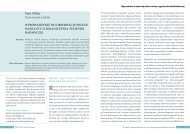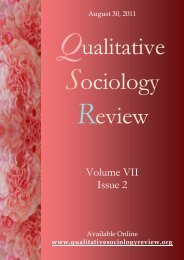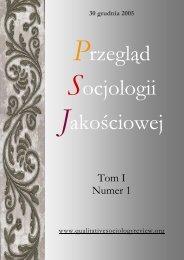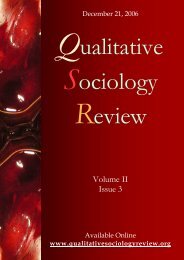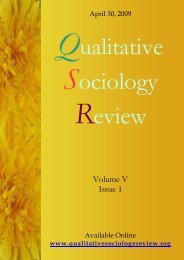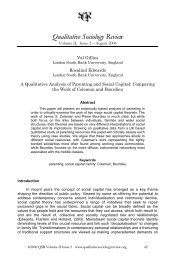Deborah K. van den Hoonaard St. Thomas University, Canada ...
Deborah K. van den Hoonaard St. Thomas University, Canada ...
Deborah K. van den Hoonaard St. Thomas University, Canada ...
Create successful ePaper yourself
Turn your PDF publications into a flip-book with our unique Google optimized e-Paper software.
<strong>Deborah</strong> K. <strong>van</strong> <strong>den</strong> <strong>Hoonaard</strong><br />
Telling the Collective <strong>St</strong>ory: Symbolic Interactionism in Narrative Research<br />
but in these stories, the men rebuffed or were frightened<br />
by the women’s forwardness. These differences<br />
reflect very different, culturally-based definitions<br />
of the situation.<br />
For the widowers, getting out was also the alternative<br />
to wallowing in one’s misery. Hence, the<br />
mirror image of the concept of getting out is sitting<br />
around. The men equated staying home with<br />
sitting around, with giving up on life:<br />
reluctance to have too many commitments, freedom<br />
and indepen<strong>den</strong>ce are two things that they appreciate<br />
about being single. These quotes communicate<br />
the spontaneous nature of the men’s activities:<br />
stuff.” … And I said, “Well, does she owe you any<br />
money?” They wouldn’t tell me that either. So finally,<br />
I said to the girl, “Well, I hope she does… You’re going<br />
to have to find her to get it.” And I never heard from<br />
them about that. (p. 59)<br />
The last sensitizing concept in the widowers’ collective<br />
story is “getting out of the house.” The absence<br />
of their wife as a companion was a frequent<br />
theme, and being busy was a notable antidote for<br />
loneliness and being alone, which the widowers<br />
I’m not just sitting around the house, moping. It’s better<br />
to be busy than sitting around doing nothing, sitting<br />
around and thinking. Now, I don’t sit around,<br />
kind of, ”What am I going to do with myself?” (p. 127)<br />
We usually call one another up and “Meet you on the<br />
river,” or something like that. Usually ski up and down<br />
the river and go across the road there. Don’t have to<br />
drive anywhere. Just put on my skis and go. (p. 133)<br />
Like I say, the pool [in the retirement community] is<br />
This and other stories the men recounted have the<br />
theme of “winning” that is familiar in stories which<br />
portray a man as a “lone hero pitted against the<br />
odds” (Coates 2003:196).<br />
talked about as if they were synonymous. The<br />
solution for these widowers was “getting out of<br />
the house.” This sensitizing concept encompasses<br />
According to this widower, having nothing to do is<br />
equivalent to not getting out:<br />
a meeting place. You meet everybody there, eventually.<br />
So, if I want…people, I go down to the pool in the morning.<br />
If I want to be left alone, I just stay away. (p. 132)<br />
The collective story of older widowers illustrates<br />
the challenges around masculinity for older men.<br />
The sensitizing concepts that fill out the story<br />
how uncomfortable the men felt when they were<br />
alone in their house and the imperative to keep<br />
busy that is often seen as a panacea to life’s problems<br />
for older people (Ekerdt 1986).<br />
When the widowers’ wife died, the meaning of<br />
being at home changed. They found it challenging<br />
to spend time in their empty house. For example,<br />
one man told the story of the first time he<br />
entered his house after his wife’s death:<br />
From a home point of view, for the first few months<br />
after her death, and particularly the first time<br />
I opened the door. I looked in to see if she was playing<br />
Solitaire at the table…and she wasn’t there. And<br />
so, the house was like a big, empty cavern, canyon,<br />
cave, anything you want to express is. There was<br />
an emptiness there, and I was looking for her, and<br />
I couldn’t find her. And then, gradually, I accepted<br />
the fact… I got this storey and a half house all to<br />
myself, and I’ve got to live with it. (p. 126-127)<br />
This man’s alliterative description captures the<br />
discomfort of being home alone. The only solution<br />
is to “get out of the house.”<br />
[Were there any times that were more difficult than<br />
others?] [When] you’ve got nothing to do… Like an old<br />
dog, you go out [to] the road and look up and down the<br />
road and say, “Which way am I going to go today?”<br />
… Like I say, you just have to pick up and go somewhere…<br />
Just get in the truck, head for town. (p. 128)<br />
Put succinctly:<br />
I go out as frequently as I can… So, what I do is go out<br />
– get the hell out of the house. (p. 128)<br />
The importance of “getting out” is related to the<br />
men’s reluctance to have guests in their home. Their<br />
collective story of keeping socially connected by<br />
going out suggests that they are not likely to invite<br />
guests in:<br />
I rattle around this house like a pea in a box. I get out<br />
quite a lot. Try to mix and socialize. (p. 128)<br />
I like to have people around. I hate being alone. That’s<br />
why I’m gone all the time. (p. 129)<br />
“Getting out” is also a mechanism for informal and<br />
unplanned socializing. It reflects many widowers’<br />
Finally, community events provide opportunities<br />
for some widowers to maintain a full social life:<br />
I got to quite a few concerts… Meet friends there…<br />
I keep myself busy… Everybody asks me where the<br />
church suppers are for the weekend. So, I start looking<br />
about Wednesday…and I’ll go to a church supper<br />
on Saturday… And, you meet a lot of friends<br />
there… So, it almost got to the point where people<br />
go to the supper and say, “Oh, I wonder if Patrick<br />
will be here.” (p. 132)<br />
Just as there was a signature story for the collective<br />
story of widows, there is also one that communicates<br />
the challenge of older widowers to preserve<br />
their masculinity. This story involves a widower’s<br />
attempt to get customer loyalty points from<br />
two different stores:<br />
Like I went to [the store]; I knew she used to have<br />
[their] credit card. And she had [their customer-loyalty<br />
card]. So, I went in one day…to transfer her…points<br />
to my name. No way in hell. No, they wanted a copy<br />
of her will… They wanted her death certificate… So,<br />
that kind of ticked me off… They say, “Well, maybe<br />
you kicked her out, and you’re trying to take all her<br />
bring attention to areas that challenge widowers’<br />
masculinity, such as lack of control and developing<br />
new skills that were traditionally done by<br />
women. If there was one statement that sums up<br />
the men’s collective story, it is: “I was the man.”<br />
Iranian Bahá’í Refugees in Atlantic<br />
<strong>Canada</strong><br />
The last collective story is that of Iranian Bahá’í<br />
refugees who settled in Atlantic <strong>Canada</strong>. The<br />
Bahá’í faith originated in Persia (now Iran) in<br />
the mid-19 th century when a young man, the Báb,<br />
announced himself a prophet of God and the Harbinger<br />
of a Manifestation of God who would bring<br />
in a new era in human history. Baha’u’lláh proclaimed<br />
himself to be this messenger and spent<br />
the last 39 years of his life as a prisoner and exile. 7<br />
Bahá’ís have been persecuted in Iran since that time.<br />
After the Islamic Revolution of 1979, the persecution<br />
became a severe and systematic attempt to strangle<br />
the community.<br />
7<br />
Bahá’í social teachings include the unity of humanity, the<br />
equality of women and men, and the elimination of racial and<br />
other prejudices, among others.<br />
40<br />
©2013 QSR Volume IX Issue 3<br />
Qualitative Sociology Review • www.qualitativesociologyreview.org 41



